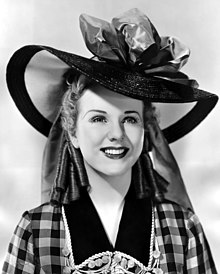Deanna Durbin | |
|---|---|
 Durbin in 1944 (publicity photo for Can't Help Singing) | |
| Born | Edna Mae Durbin December 4, 1921 Winnipeg, Manitoba, Canada |
| Died | April 17, 2013 (aged 91) Paris, France |
| Occupation(s) | Actress, singer |
| Years active | 1935–1949 |
| Spouses | Vaughn Paul
(m. 1941; div. 1943) |
| Children | 2 |
Edna Mae Durbin (December 4, 1921 – April 17, 2013),[1] known professionally as Deanna Durbin, was a Canadian-born American singer and actress, who moved to the U.S. with her family in infancy. She appeared in musical films in the 1930s and 1940s. With the technical skill of a legitimate lyric soprano, she was known for singing opera semi-classical music, which is today called classical crossover.
Durbin was a child actress who made her first film appearance with Judy Garland in Every Sunday (1936), and subsequently signed a contract with Universal Studios. She achieved success as the ideal teenaged daughter in films such as Three Smart Girls (1936), One Hundred Men and a Girl (1937), and It Started with Eve (1941). Her work was credited with saving the studio from bankruptcy,[2] and led to Durbin being awarded the Academy Juvenile Award in 1938.
As she matured, Durbin grew dissatisfied with the girl-next-door roles assigned to her and attempted to move into sophisticated non-musical roles with film noir Christmas Holiday (1944) and the whodunit Lady on a Train (1945). These films, produced by frequent collaborator and second husband Felix Jackson, were not as successful; she continued in musical roles until her retirement. Upon her retirement and divorce from Jackson in 1949, Durbin married producer-director Charles Henri David and moved to a farmhouse near Paris. She withdrew from public life, granting only one interview on her career in 1983.
- ^ Cite error: The named reference
ssdiwas invoked but never defined (see the help page). - ^ Clarke, Gerald (2001). Get Happy: The Life of Judy Garland. New York: Random House. p. 76. ISBN 978-0385335157.